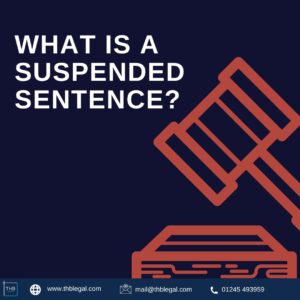Inheritance tax is changing in 2026
What farming families and business owners need to know If you own a farm,...- 11 February 2026
Posted: 07 June 2024
A suspended sentence is a custodial sentence where the offender does not go to prison. On the condition that they do not commit any further offences during the operational period and comply with the requirements of the order.

This gives the offender the opportunity to demonstrate rehabilitation by complying with the order.
A custodial sentence of up to two years can be suspended for a period between six months and two years. A Judge or Magistrates will impose an appropriate sentence taking into consideration sentencing guidelines and the facts of the case.
Factors which may influence the decision to suspend a custodial sentence could be a realistic prospect of rehabilitation, strong personal mitigation or that an immediate custodial sentence would result in a significant impact on others.
The Judge may be less inclined to suspend a sentence if the offender presents a risk or danger to the public, they have a history of poor compliance with previous court orders and appropriate punishment could only be achieved by an immediate custodial sentence.
In 2022, around 42,000 offenders had a suspended sentence imposed which represents around 4% of offenders sentenced.
The penalty for breaching a suspended sentence order depends on whether a new offence has been committed or it relates to non-compliance with the order.
An individual would be in breach of their suspended sentence order if they have failed to comply with the requirements. Non-compliance with the order is a criminal offence and likely to trigger activation of the custodial sentence.
However, the Court will consider how the offender has complied with the order prior to the breach. If the breach is minor and the offender’s compliance with the order has otherwise been good, then the Court may choose to issue a fine or impose tougher requirements rather than activating the custodial sentence.
If the Court choose to activate a custodial sentence, they will consider compliance with the order. This may lead to an appropriate reduction of the custodial term for any unpaid work or curfew requirements completed.
An individual can also breach the suspended sentence order by committing an offence during the operational period. In most cases on conviction of a further offence whilst subject to a suspended sentence, the starting point would be for the Court to activate the custodial sentence. The Court will consider whether it would be unjust to activate the term, and can activate part, or all of the sentence depending on the circumstances.
The predominant factor in determining whether it would be unjust is the facts and nature of the new offence and the level of compliance with the suspended sentence order.
The Court may also consider factors such as strong personal mitigation, a realistic prospect of rehabilitation and the impact a custodial sentence would have on others. Although, only new and exceptional factors not present at the time the suspended sentence order was imposed should be considered.
In cases where the court considers that it would be unjust to activate the custodial sentence it must state the reasons why and either:
If you are charged with an offence serious enough for a custodial sentence to be passed, then it is important that you seek legal advice. Please contact our experienced criminal lawyers who can provide representation and advise you on likely sentence. Call Chelmsford Office 01245 252432, Benfleet Office 01268 792994, Braintree 01376 559690, Ipswich 01473 226 or send an email
- 11 February 2026
- 09 February 2026
- 07 February 2026